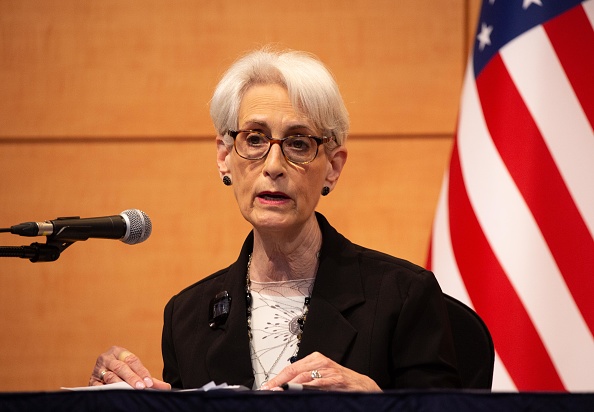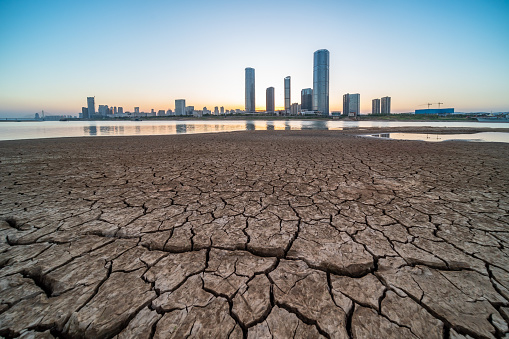
 A Heavy Price
A Heavy PriceU.S.-China relations have been spiraling to a new low following Nancy Pelosi's recent visit to Taiwan, which precipitated a significant show of military force and diplomatic anger from Beijing. Despite the hostilities, an open line of communication remains between the two powers. Qin Gang, China's Ambassador to the United States, and Wendy Sherman, U.S. Deputy Secretary of State, met face-to-face in Washington, where the two sides discussed issues of mutual concern.
"We have and will continue to keep the lines of communication open with the PRC," said State Department deputy spokesperson Vedant Patel during a phone briefing. "Beijing has shut down some key communication channels and cooperation across several vital issues that affect the entire world. But the United States continues to seek an open and constructive line of communication to manage our differences, especially during moments of tension."
In the meantime, Taiwan announced a huge increase in defense spending for next year, and will be facing several years of double-digit growth in military spending in the coming years, as its current strategy to defend against Chinese threats includes the need for new fighter jets, more missiles and larger warships.
Taiwan is determined to defend itself and invaders will incur a "heavy price," President Tsai Ing-wen said, speaking on the anniversary of a 1958 confrontation in which Taiwanese forces beat back Chinese attackers. "What we have to do is to let the enemy understand that Taiwan has the determination and preparation to defend the country, as well as the ability to defend itself," she added.
Read more in, "Parsing the New Sino-American Crisis," by Richard Weitz, a Senior Fellow at the Hudson Institute.
 Rescuing Growth
Rescuing GrowthChina is taking major steps to shore up its economy, as the government's official gross domestic product growth goal of "around 5.5%" is now well out of reach. In recent months, there has been a significant downturn in the Chinese economy because of Covid lockdowns and a deepening property decline. The current unprecedented heatwave and drought will also likely hamper growth, and international businesses are already facing power outages.
In response, Beijing has pledged a further 1 trillion yuan ($146 billion USD) in economic stimulus. In a 19-point policy package, Beijing has put forth an ambitious plan to shore up its economy, improve infrastructure, ease power shortages, and tackle drought, including money to "secure drinking water" supply.
A statement from the State Council expressed that "the current economic recovery has a weak foundation," adding that the new funding was aimed at stabilizing the economy.
In a surprise move, China has decided to prop up the yuan after it fell to two-year lows against the dollar, reflecting the strength of the U.S. currency and a divergence in monetary policy between the world's leading economies. China's currency has struggled this year, reflecting the growing strength of the U.S. dollar and broader fears about the state of the Chinese economy.
Read more in "Inflation Risks in Monetary Policy," by Zhang Monan, the Deputy Director of the Institute of American and European Studies at CCIEE.
 An Unprecedented Heat
An Unprecedented HeatThe unprecedented heat waves that struck China this summer continued this week, breaking records both domestically and globally. The wave has stretched past 70 days, the longest and most widespread on record, with around 30% of the 600 weather stations along the Yangtze River recording their highest-ever temperatures. The extreme heat has also coincided with severe droughts, leading to wilted crops, forest fires, and dried-up rivers. China's largest freshwater body in the country, Poyang Lake, has shrunk by more than two-thirds, leaving mud flats throughout the waterbed. Receding waters have even revealed long-submerged ancient bridges and Buddhist statues.
The impacts of the heat and droughts have throttled back some of China's hydropower production, which the country heavily relies on for its energy needs, and provoked the government to cut power to key industrial hubs in Sichuan this week. The disasters are also wreaking further havoc on China's economy, after a summer of multiple lockdowns due to the ongoing pandemic, throwing yet another wrench into the global supply chains.
One major question is how much climate change has contributed to this disaster, particularly following other extreme weather seen globally over the last year, including wildfires in the U.S., heatwaves in India and Pakistan, and more.
"I can't think of anything comparable to China's heat wave of summer 2022 in its blend of intensity, duration, geographic extent and number of people affected," meteorologist Bob Henson, a contributor to Yale Climate Connections said. Henson also noted the simultaneous extreme heat events and droughts occurring this summer in Europe, East Africa, and the U.S.
Prepared by China-US Focus editorial teams in Hong Kong and New York, this weekly newsletter offers you snap shots of latest trends and developments emerging from China every week, while adding a dose of historical perspective.
- 2022-08-19 Risky Business
- 2022-08-12 Backtracking
- 2022-08-05 Cross-Strait Outrage
- 2022-07-29 Playing with Fire
- 2022-07-22 Nixonian Flexibility
- 2022-07-15 List Diplomacy
- 2022-07-08 Easing Tariffs, Not Tensions
- 2022-07-01 Getting Tough
- 2022-06-24 Tools in the Box
- 2022-06-17 Unprecedented Oversight
- 2022-06-10 Squaring Off
- 2022-06-03 Diplomatic Chills
- 2022-05-27 Competing Visions
- 2022-05-20 Common Ground
- 2022-05-13 Bilateral Interests
- 2022-05-06 Vying for Mutual Benefit
- 2022-04-29 Seeking Relief
- 2022-04-22 Tipping Point
- 2022-04-15 “Persistence is Victory”
- 2022-04-08 No Divorce
